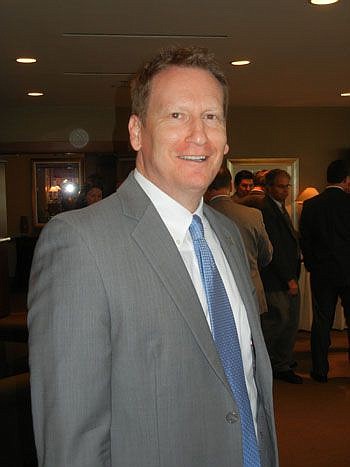
It might seem like residential communities are mushrooming around the area, but housing starts remain below their 2005 peaks, and that might be hindering economic growth.
Christopher Oakley, a Jacksonville Federal Reserve Bank of Atlanta executive, said Wednesday his business contacts see a lack of inventory, especially “starter homes” in a lower price range.
“That may be holding things back a little bit, but it also may create some opportunity for builders in the area as well,” he said.
Oakley, vice president and regional executive of the Jacksonville Branch of the Federal Reserve Bank of Atlanta, spoke to the Economic Roundtable of Jacksonville at the Downtown Fed branch.
During his presentation, Oakley shared trends toward an improving housing market. “We are slowly getting back to what the new normal is,” he said.
The issue is the supply of starter homes, creating a niche market for builders.
Oakley compiles his information to share with the president of the Atlanta Fed and ultimately the Federal Open Market Committee.
That committee is the monetary policymaking body of the Federal Reserve System.
Overall, Oakley said the business executives he surveys are “reasonably upbeat” about the Northeast Florida economy, although job cuts are of concern.
“I don’t want to point the finger to any particular organizations, but everyone in the room knows that we do have some of our major players that are going through some significant changes, and that’s something I think we’re paying a lot of attention to, he said.
Oakley appeared to refer to CSX Corp., which recently eliminated 800 management jobs, including 500 in Jacksonville, as new CEO Hunter Harrison joined the company. Harrison is known as a cost-cutter.
Oakley also cited positive feedback about port activity in the Southeast.
The Fed’s sixth district is based in Atlanta and comprises six states. Its five branches include Jacksonville.
The Federal Open Market Committee recently raised the federal funds rate target to a range of .75 to 1 percent as it expects nationwide economic activity will continue to expand moderately.
Near-term risks to the economic outlook appear roughly balanced, according to Oakley’s presentation.
The committee projects economic growth of 2 to 2.5 percent this year, in no small part because of consumer spending.
“The consumer is hanging in there,” he said.
Retail sales have been reasonably strong, the unemployment rate has dropped to 4.7 percent, inflation remains low and wages are rising, he said.
The economy appears to be expanding at a moderate pace, said Oakley’s report.
Business optimism, consumer confidence and equity markets have risen markedly since the November presidential election, he said, but so far that has not translated into increased spending and business activity.
Recent labor market indicators are consistent with an economy that is closing in on full employment, he said.
“The overall view is pretty positive,” he said.
U.S. February snapshot
Unemployment rate 4.7%
Annualized housing starts 1.29 million
Labor force participation rate 63%
Indicator Feb.-Feb.
Retail sales Up 5.7%
Average monthly job gain 195,800
Labor force entrants 1.2 million
Source: Federal Reserve Bank of Atlanta
@MathisKb
(904) 356-2466